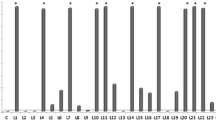Abstract
Rhizobacteria strains were characterized for ability to synthesize hydrogen cyanide and for effects on seedling root growth of various plants. Approximately 32% of bacteria from a collection of over 2000 isolates were cyanogenic, evolving HCN from trace concentrations to >30 nmoles/mg cellular protein. Cyanogenesis was predominantly associated with pseudomonads and was enhanced when glycine was provided in the culture medium. Concentrations of HCN produced by rhizobacteria were similar to exogenous concentrations inhibiting seedling growth in bioassays, suggesting that cyanogenesis by rhizobacteria in the rhizosphere can adversely affect plant growth. Growth inhibition of lettuce and barnyardgrass by volatile metabolites of the cyanogenic rhizobacteria confirmed that HCN was the major inhibitory compound produced. Our results suggest that HCN produced in the rhizospheres of seedlings by selected rhizobacteria is a potential and environmentally compatible mechanism for biological control of weeds.
Similar content being viewed by others
Author information
Authors and Affiliations
Additional information
Received: 13 December 2000/Accepted: 6 February 2001
Rights and permissions
About this article
Cite this article
Kremer, R., Souissi, T. Cyanide Production by Rhizobacteria and Potential for Suppression of Weed Seedling Growth. Curr Microbiol 43, 182–186 (2001). https://doi.org/10.1007/s002840010284
Issue Date:
DOI: https://doi.org/10.1007/s002840010284




